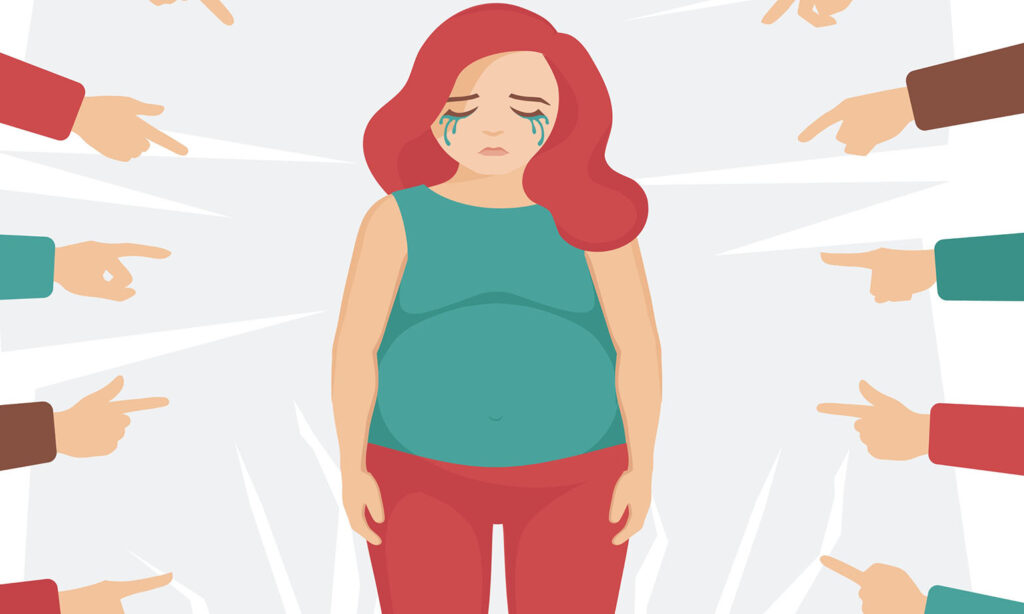Fat shaming is one of the most insidious and damaging forms of body shaming. It can have a negative impact on both physical and mental health. And it makes things worse for people who are already struggling with their weight. In this blog post, we will discuss the negative effects of this shaming and how we can work to reverse them.
Contents
Understanding Fat Shaming
 Fat shaming is a form of discrimination that occurs when an individual or group of people make negative comments about another person’s weight or size. This type of behavior can occur in any setting, including the workplace, school, and social situations. It often involves name-calling, teasing, or other derogatory remarks intended to hurt the fat person’s feelings and belittle them.
Fat shaming is a form of discrimination that occurs when an individual or group of people make negative comments about another person’s weight or size. This type of behavior can occur in any setting, including the workplace, school, and social situations. It often involves name-calling, teasing, or other derogatory remarks intended to hurt the fat person’s feelings and belittle them.
This fat-shaming can take various forms, such as ordering larger people to diet or exercise, comparing them to thinner people, suggesting they are lazy and lack self-discipline, and making other hurtful comments about their size. In fact, it can also happen in subtle or indirect ways, like when someone uses words like “diet” or “weight loss” as compliments.
Weight bias is a severe issue in today’s society. Research revealed that almost two-thirds of citizens think obesity is due to an individual’s decisions. While nearly half deem obese people as sluggish and unmotivated. These kinds of perceptions lead to mistreatment and inequality toward overweight individuals.
Negative Impacts Of Fat Shaming
Fat shaming can be extremely detrimental to a person’s mental and physical health. Here are some of the negative impacts it can have:
Increase in Stress Levels
Being subjected to fat shaming can increase stress levels, which can lead to a host of health problems such as high blood pressure and anxiety. For example, a study has found that overweight women who experienced this shaming had higher levels of cortisol, the stress hormone, compared to their non-fat-shamed counterparts.
Low Self Esteem and Poor Body Image
Fat shaming can also lead to low self-esteem and poor body image. This can be especially damaging to adolescents and young adults who are already struggling to find their place in the world. Those who experience fat shaming may become less likely to engage in activities such as exercise, which can further contribute to poor health outcomes.
Increased Risk of Eating Disorders
Those who experience fat shaming may be more likely to develop disordered eating behaviors, such as binge eating or anorexia. According to a study, more than one-third of participants reported that this shaming had contributed to their development of unhealthy eating patterns.
Social Withdrawal
Fat shaming can also lead to social withdrawal, as those who experience it may become less likely to engage with others and may avoid public spaces. This can lead to feelings of loneliness and isolation, which can further contribute to mental health issues.
Depression
Perhaps one of the most serious effects of this shaming is depression. Studies have found that those who experience this shaming are more likely to suffer from depression, as they internalize the negative messages they’re receiving and believe that they are less valuable because of their size.
All in all, the negative impacts of this shaming can make things worse for those who are already struggling with their mental and physical health. It’s important to remember that everyone deserves respect, regardless of size or shape. We should strive to create an environment where fat shaming is not tolerated and individuals can feel supported in their journey toward self-acceptance.
Tips To Reverse The Impacts Of Fat-Shaming
 If a person is dealing with the consequences of fat-shaming, there are steps they can take to try and reverse the impacts.
If a person is dealing with the consequences of fat-shaming, there are steps they can take to try and reverse the impacts.
Find a support system
Whether it’s friends, family members, or a mental health professional, find people who will listen to your story without judgment and provide understanding and compassion. Having someone you feel comfortable talking to can help you process and move forward from the experience of fat-shaming. For instance, if the fat-shaming was conducted in a work environment, you may wish to reach out to a trusted supervisor or Human Resources representative.
Focus on self-care
Fat shaming can have serious mental and emotional consequences, so it’s important to focus on taking care of yourself. Make time for activities that bring pleasure and joy, such as going for walks in nature, indulging in comforting hobbies like knitting or drawing, and cooking healthy meals. Emotional support can also be beneficial — practice affirmations that challenge negative self-talk.
Educate yourself
Learn about the social and cultural implications of this shaming and how to respond when faced with a fat-shaming situation. Read books and articles from authors who write about body positivity, fat acceptance, and health at every size movement.
Be proactive
If you’re comfortable doing so, actively work to challenge fat stigma in society by speaking out against it when you hear it in conversation or see it online. For example, you might respond to fat-shaming comments with positivity or share articles about body acceptance on social media. When you use your voice to challenge fat-shaming, you can inspire others to do the same and make a positive difference.
Practice self-love
Finally, work on accepting and loving your body as it is. Everyone goes through difficult times, but remember that everyone has something valuable and lovable about them. Acknowledge that you are worthy of love and respect, no matter your size.
These tips can help to reverse the impacts of fat-shaming and ultimately lead to a healthier, more positive outlook on life. With some self-care and education, it’s possible to heal from the hurtful experience and learn how to better protect yourself in future situations.
How Can You Stop Fat Shaming?
 The stigma of fat shaming is a problem that needs to be addressed. But how can we stop it? Here are some tips:
The stigma of fat shaming is a problem that needs to be addressed. But how can we stop it? Here are some tips:
- Educate yourself on the effects of this shaming and its impact on individuals, communities, and society as a whole. As with any form of discrimination or oppression, understanding the issue is key to fighting it.
- Speak out against fat-shaming whenever you see or hear it happening. Even if it seems small, every comment contributes to the issue and can have a profound effect on the person being shamed.
- Educate others about the harms of fat-shaming through social media, conversations, and other outlets for raising awareness.
- Support body-positive initiatives and organizations that promote acceptance of all bodies regardless of size, shape, or weight.
- Replace negative self-talk with positive affirmations and reject any messages from the media or society about what is considered acceptable for different body types.
- Make sure to practice self-care and find ways to stay positive and boost your self-esteem.
- Embrace diversity and be kind to everyone you meet, regardless of their size. Remind yourself that everyone deserves respect and acceptance, no matter what they look like.
By following these tips, we can all work together to put an end to fat shaming and create a more inclusive, kinder society. Every person deserves to be respected and accepted for who they are, so let’s strive to make that a reality!
Conclusion
In conclusion, fat shaming makes things worse for those affected by obesity. It increases the chance of depression, anxiety, and eating disorders. Not only this, but it can also lead to increased health risks, such as high blood pressure and cholesterol levels. Furthermore, this shaming has been found to be unhelpful in motivating people to lose weight.
Therefore, it is important that society stops fat shaming and instead works to build a more inclusive. And a supportive environment that respects all body types. People should be aware of their own biases and strive to recognize the impact their words and actions can have on others. Ultimately, if we want to reduce obesity, a better approach is needed than this.
If you’re interested in learning more, seek the expertise of FitMantra! Our experienced nutritionists can be easily accessed with just a few clicks. And will offer personalized support to assist you in achieving your fitness goals. Our online nutrition counseling, and weight loss program has been designed to help you shed those unwanted pounds! Don’t forget to download our Fitness App available on Android.

You have remarked very interesting details! ps nice
site.Raise blog range